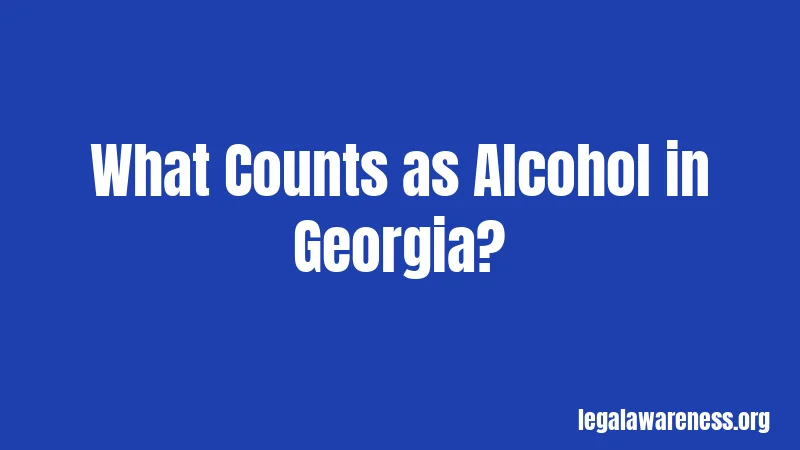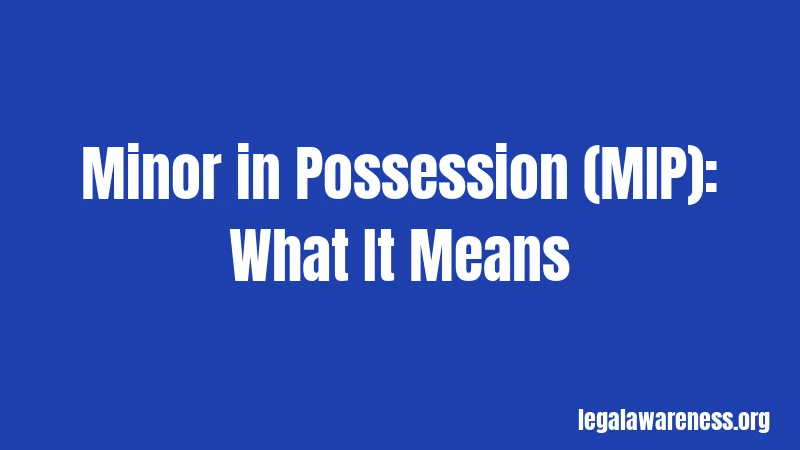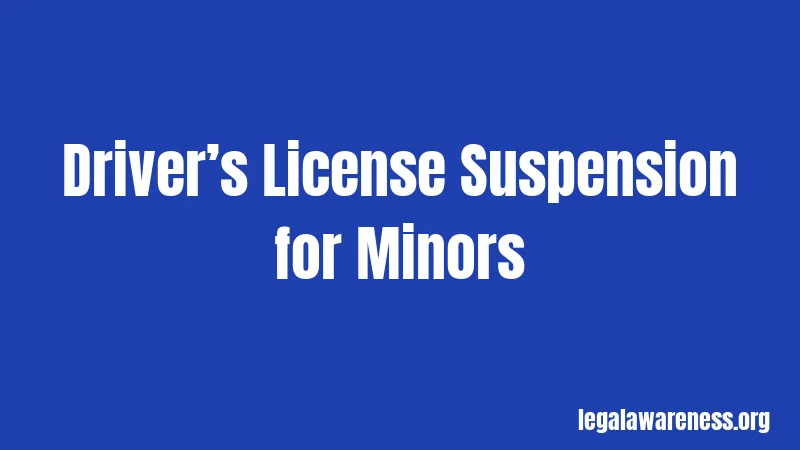Georgia Alcohol Laws in 2026: What You Actually Need to Know
Most people have no idea how strict Georgia’s alcohol laws actually are. Seriously. And if you break them, the penalties can get real expensive. Whether you’re just visiting, live here, or work in the alcohol industry, knowing these rules is important. Let’s break down everything you need to know without all the confusing legal jargon.
Georgia has some pretty detailed rules about buying, drinking, and driving with alcohol. Some of these rules come straight from the state. Others come from local cities and counties. That means the rules can actually change depending on where you are in Georgia. Confusing? Yeah. But don’t worry. We’ll clear it up.
What Counts as Alcohol in Georgia?

Georgia’s law considers something “alcohol” if it contains at least 0.5% alcohol by volume. That includes beer, wine, spirits (liquor), and any mixed drinks. Even sake counts. Pretty much any drink you think of as alcoholic? Georgia considers it alcohol.
This matters because the law applies to all of these types equally. There’s no special treatment for beer versus wine or spirits. They’re all covered by the same basic rules.
Legal Drinking Age and Underage Drinking Laws
The legal drinking age in Georgia is 21. No surprises there. But here’s where it gets strict: Georgia doesn’t allow any exceptions for underage drinking, even at home with parental permission.
Wait, there are a couple of exceptions. Religious ceremonies and medical purposes. That’s it. Your parents can’t give you a beer at dinner. A teenager at a wedding ceremony can’t have a sip of wine. Even trying to buy alcohol when you’re under 21 is illegal.
Wondering if this really applies to you? Absolutely. If you’re under 21 in Georgia, the law treats underage drinking as a crime. Not a mistake. Not a learning experience. A crime.
Minor in Possession (MIP): What It Means

“Minor in Possession” or MIP is the official charge for underage drinking. You can be charged with MIP for:
Possessing alcohol (holding it, having it nearby, keeping it in your backpack, whatever). Consuming alcohol (actually drinking it). Purchasing alcohol (trying to buy it, using a fake ID, asking someone to buy for you).
Not sure what counts as possession? Here’s the thing: Even the smell of alcohol on your breath is enough for a police officer to charge you with MIP. You don’t need to actually have a bottle in your hand.
MIP Penalties: This Gets Serious
Let’s talk about what happens when you get caught. For a first offense, you’re looking at:
Up to $300 in fines. Up to six months in jail. Mandatory community service. An alcohol education program (required).
A second offense? The penalties jump significantly. Fines can go up to $1,000. Jail time could be up to a full year. More community service. And longer education programs.
Here’s something most people don’t realize. A MIP stays on your criminal record for life. This isn’t a juvenile record that disappears. It’s a permanent criminal conviction. That affects college admissions, job applications, financial aid, everything.
Driver’s License Suspension for Minors

Want to know what might hurt the most? Your license.
A first MIP conviction means a six-month license suspension. No driving to school. No driving to work. Nothing. For a second offense, it’s a full year without your license. And here’s the kicker: You might not qualify for a restricted driving permit, which would normally let you drive for school or work.
For underage DUI (even with just a tiny amount of alcohol), you could lose your license for 120 days minimum. This applies even if you’re not charged with DUI.
Underage DUI: Zero Tolerance
Okay, pause. Read this carefully. Georgia has what’s called a “zero-tolerance” law for drivers under 21.
This means any amount of alcohol in your system while driving is illegal. Your blood alcohol limit is 0.02%. That’s tiny. Like, one drink could put you over. Even if you’re not actually drunk or impaired, you can still be arrested and convicted.
An underage DUI charge brings even harsher penalties than regular MIP. You’re looking at misdemeanor charges (or felony for repeat offenses), fines from $300 to $1,000, up to one year in jail, and mandatory community service. Plus, you lose your license.
And honestly? This is the part most young people don’t understand. You don’t have to be drunk to get charged. You don’t have to be dangerous. Just any alcohol at all while driving under 21 is a crime in Georgia.
Age Restrictions for Purchase
The basic rule: You must be 21 to buy alcohol. Period.
Attempting to buy alcohol when you’re under 21 is illegal. Using a fake ID is illegal. Asking someone to buy alcohol for you is illegal. That older friend who buys the beer? They’re also breaking the law. They could face serious charges too.
If a retailer sells alcohol to you when you’re underage, they face significant penalties. Fines up to $1,000. Loss of their liquor license. Even jail time.
Open Container Laws: The Car Rules
Here’s where a lot of people get confused. Let’s talk about drinking and driving.
Georgia’s open container law is actually pretty specific. You can’t have an open container of alcohol in the passenger area of your car. Open means the seal is broken, the can is opened, or the contents have been partially removed. Even a sip counts.
This applies whether you’re driving or just sitting in the car as a passenger. If there’s an open drink in the passenger area and the car is on a public road or highway, someone’s breaking the law.
Sound complicated? It’s actually not. Just keep all drinks in sealed containers. That’s basically it.
Open Container Penalties
If you get caught with an open container in your car, you face a fine up to $200. Not terrible, right? But wait, there’s more. You also get two points on your driver’s license. This seems small, but here’s why it matters:
If you accumulate 15 or more points within 24 months, your license gets suspended for an entire year. So that open container ticket could be the one that pushes you over the edge.
If you’re under 21 with an open container while driving, you could lose your license for 120 days. And you might also face separate Minor in Possession charges.
Don’t forget about insurance. Insurance companies view open container violations almost as seriously as they view DUI. Your premiums could jump by 44%. That means your car insurance could nearly double because of one mistake.
Exceptions to the Open Container Law
Okay, here are situations where open containers are actually allowed:
Party buses or limousines (designed to transport people for money). The living area of a motor home or RV. A partially consumed bottle of wine from a restaurant (if it’s sealed in a bag by the restaurant staff and placed in your trunk).
That’s pretty much it. Everything else? Keep it sealed or keep it out of the car.
Drinking and Driving: DUI Laws
Let me break down the legal alcohol limits for driving.
For adults 21 and older: Your blood alcohol concentration (BAC) limit is 0.08%. Reach that level and you can be arrested for DUI. For commercial drivers (truck drivers, bus drivers): Your limit is 0.04%. For drivers under 21: Your limit is 0.02% (zero-tolerance).
Here’s the important part. These are the legal limits. But Georgia law also says you can’t drive if alcohol makes it “less safe” for you to drive. So even below the legal limit, you could be charged with what’s called “DUI-less-safe.” It’s just as serious as a regular DUI.
DUI Penalties in Georgia
A first DUI conviction in Georgia is incredibly serious. You’re looking at:
A fine between $300 and $1,000. Between 24 hours and 12 months in jail. Suspension of your driver’s license for at least 120 days. Mandatory completion of a DUI education program. Possible community service and probation.
And here’s something nobody wants to hear: A DUI stays on your record forever. Georgia doesn’t allow you to have it expunged or removed. It’s permanent.
A second DUI brings even harsher penalties, including up to 12 months in jail and license suspension for at least one year. A third offense becomes a felony. Fourth offense? Also a felony. Your penalties keep getting worse.
Where You Can Buy Alcohol
Let’s talk about where alcohol is actually sold in Georgia.
Beer and wine are available at most grocery stores, convenience stores, and gas stations. You can’t buy liquor there, though. Liquor (distilled spirits) is only sold at specially licensed package stores. Some counties don’t allow any alcohol sales. These are called “dry counties.” Right now, dry counties in Georgia include Bleckley, Coweta, Dodge, Effingham, Franklin, Hart, Lumpkin, Murray, and Union. White County is dry too, except for the city of Helen.
A few counties have extra restrictions. Butts and Decatur counties don’t allow alcohol in bars and restaurants. Upson County doesn’t allow retail sales but does allow restaurant service.
And here’s something recent that changed: In 2021, Georgia made it legal for restaurants to sell cocktails to go. This was a pandemic-era change that stuck around. You can now grab a cocktail in a sealed cup and take it with you, as long as it’s within the restaurant’s jurisdiction.
Alcohol Sales Hours
When can you actually buy alcohol? It depends on where you are and what you’re buying.
For off-premises sales (liquor stores, grocery stores): Monday through Saturday, sales stop at 11:45 p.m. On Sundays, sales can’t start before 12:30 p.m. and must stop by 11:30 p.m.
For on-premises sales (bars and restaurants): Monday through Saturday, they can’t sell before 9 a.m. or after 2 a.m. On Sundays, some places have “brunch laws” that let them start at 11 a.m. (instead of 9 a.m.). Last call is still 11:30 p.m.
But remember: Individual cities and counties can make stricter rules. So some places might have earlier closing times. Always check your local laws.
Special Permits and Exceptions
Georgia does allow some exceptions for special events. Local governments can issue special permits for outdoor drinking in certain designated areas. A great example? Savannah’s Historic District allows open containers in certain riverside areas during specific hours. But these are rare and only in certain places.
To-go cups are another example. Some areas have created “to-go cup zones” where you can buy a drink in a sealed cup and walk around drinking it. Columbia County is one example. But this only applies in the specific zone. And you have to buy it at the designated location.
Home brewing is allowed. You can make beer at home (up to 100 gallons per adult annually, maximum 200 gallons per household). But if you transport homebrew to an event, it must be sealed and labeled correctly.
Recent Law Changes
In 2021, Georgia made to-go cocktails permanently legal. This was originally a pandemic rule but became permanent. Restaurants can now sell mixed drinks in sealed cups.
Also in 2020, home delivery of beer, wine, and liquor became legal. You can order alcohol online and have it delivered (though local breweries and distilleries are excluded from this).
A bill called SB 219 proposed allowing breweries to sell and transfer more beer. It’s designed to help distribution efforts, especially for larger breweries. Smaller breweries still face the 288-ounce daily to-go cap.
Public Drinking: What You Need to Know
Here’s the thing. Drinking alcohol in public places like streets, sidewalks, and parks is generally illegal in Georgia. You can’t walk down the street with an open beer. You can’t sit in a park with a mixed drink.
But Georgia is unique. The state doesn’t have a specific statewide public drinking law. Instead, individual cities and counties create their own rules. So some areas are stricter than others. Savannah allows it in certain zones. Most other places don’t.
On private property? Totally fine. As long as you have the owner’s permission, you can drink on someone’s property. That’s not against state law.
Penalties for Businesses That Sell Alcohol
If you own a business or work in the alcohol industry, understand this: Georgia takes these laws seriously.
Selling alcohol to minors? That’s a huge penalty. Up to $1,000 in fines and 12 months in jail. Loss of your liquor license. You could also be held legally responsible if someone gets hurt because of alcohol you sold.
Selling during illegal hours, selling without a license, selling to visibly intoxicated people—these all carry serious consequences. Your license can be suspended or revoked. You could face criminal charges.
Georgia law requires training for anyone who sells or delivers alcohol. You must pass state-approved training (like TIPS training). Failure to do so is illegal.
Dry County Rules
Think Georgia is one state with one set of rules? Wrong. Dry counties complicate things.
In dry counties, no alcohol sales are allowed (with few exceptions). You literally can’t buy beer, wine, or liquor in these counties. Helen is an exception within White County. It’s “wet,” meaning you can buy alcohol there.
A few counties are partially dry. They allow some types of alcohol but not others. Or they allow sales in restaurants but not in retail stores.
If you live near a dry county border, it’s common to drive 10 or 15 minutes to buy alcohol. That’s normal. But you can’t buy alcohol in a dry county and transport it across county lines illegally.
What Happens If You Break the Law
Let’s be real. Getting arrested for an alcohol violation changes things.
You have a criminal record. This shows up on background checks for jobs. College applications might see it. Future employers will know. It affects your ability to get certain jobs, especially ones requiring security clearances or positions working with vulnerable people.
Financial impact is huge. Fines, legal fees, increased insurance rates—it adds up fast. A DUI can cost $10,000 or more when you include everything.
Your driving privileges are affected. Suspension means no driving for school, work, or anywhere else. Some jobs literally can’t exist without driving. This could cost you employment.
For students, the consequences extend beyond criminal law. Schools have their own disciplinary processes. You could face suspension, expulsion, or loss of scholarships. Many colleges run separate proceedings from criminal court.
How to Report Alcohol-Related Crimes
If you know about illegal alcohol sales, underage drinking operations, or drunk driving, you can report it.
Call local police at 911 for emergencies (like drunk drivers). Call your local police non-emergency line for tips about illegal operations. Contact your city or county alcohol enforcement office directly. Contact the Georgia Department of Revenue’s Alcohol & Tobacco Division for statewide violations.
FAQ
What’s the difference between MIP and DUI for underage drinkers?
MIP is possessing or consuming alcohol. DUI is driving after drinking. Both are crimes, but DUI is more serious. DUI involves driving, which creates public safety risk.
Can I drink alcohol at home if my parents say it’s okay?
No. Georgia law doesn’t allow parental consent exceptions. Even in your home, underage drinking is illegal.
What if I’m just a passenger with an open container?
You can still be charged. Passengers can face open container violations too. The driver might also be charged since the car is under their control.
Do I have to take a breathalyzer test if police stop me?
You can refuse, but refusing has serious consequences. Refusal is treated like driving while impaired, and you lose your license for one year on a first offense.
If someone gets hurt because of alcohol I provided, can I be sued?
Yes. Georgia law allows victims of alcohol-related injuries to sue the person who provided the alcohol, including businesses that illegally sold to minors.
Are there any ways to get an alcohol charge removed from my record?
Georgia doesn’t allow expungement of DUI charges. They stay permanent. MIP charges might be eligible for removal in some cases, but it’s complicated. Talk to a lawyer.
What about to-go cocktails? Can I drink them while walking?
Only in designated areas. In places like Columbia County’s designated zone, yes. In most other areas, no. Check your local rules.
Can I have an open container in the truck bed of my pickup truck?
If the alcohol is unreachable (like in a cooler in the truck bed instead of the cab), it’s typically okay. But the safest bet is keeping it sealed and closed in the trunk.
Final Thoughts
Georgia’s alcohol laws are strict. Stricter than most people realize. But now you know the basics. Whether you’re buying alcohol, driving with it, or serving it at your business, you know the rules.
Stay informed. Check your local city and county laws since they can vary. When in doubt, ask. Call your local police non-emergency line. Contact the Georgia Department of Revenue. Talk to a lawyer. It’s way better than learning the hard way.
If you’re underage, seriously think about these consequences. A single MIP charge affects the rest of your life. One DUI can cost thousands of dollars and destroy future opportunities. One open container ticket could push you over the license suspension threshold. These aren’t warnings meant to scare you. They’re just facts about how Georgia law works.
Drink responsibly. Follow the law. And if you ever get arrested, get a lawyer immediately. Your future depends on it.
References
- Georgia Department of Revenue – Alcohol & Tobacco Division
- Georgia Code § 40-6-253 – Open Container Law
- Georgia Code § 3-3-23 – Furnishing to Minors
- Georgia Code § 40-6-391 – Driving Under the Influence
- NIAAA Alcohol Policy Information System – Georgia
- Georgia Department of Revenue – Alcohol License Renewal Information
- Harrison & Medlin, P.C. – Georgia Public Drinking Laws
